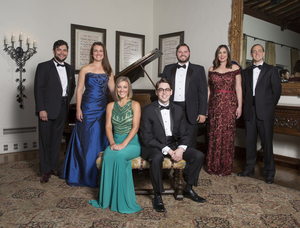Review: ARIZONA OPERA STUDIO CONCERT at Mon Orchid Gallery

On Monday October 14, 2019, Arizona Opera and its Valley Friends presented a concert of arias by the Marion Roose Pullin Studio Artists at the Mon Orchid Gallery, a small hall with excellent, if somewhat live, acoustics. As a rule, AZ Opera chooses six singers and one pianist to be their studio artists. The program helps bridge the gap between the protected environment of academic studies and the rigors of a professional career. The choice of singers is often made from among four to five hundred applicants, so only the best young singers graduating from this country's universities get these positions. At this concert, tenor Bille Bruley was missing because he was covering (understudying) a role in Lyric Opera of Chicago's production of Jake Heggie's Dead Man Walking.
Soprano Cadie Jordan, a second-year Studio member, opened the program with "Sleep why dost thou leave me" from Handel's 1744 opera, Semele. She began with a significant messa di voce on the first note and continued with a smooth legato and a well placed trill. Although she did not decorate her line at any point, she showed both the beauty of her even range and her technical ability. Later, she returned with a fine interpretation of "Einst träumte meiner sel'gen Base ("My late cousin had a dream") from Weber's Die Freischütz. Kudos also to collaborative pianist Robert Bosworth whose articulation was absolutely precise in the latter difficult piece.
First-year member, baritone Rob McGuinness, began with "Avant de quitter ces lieux" ("Before leaving this place") from Gounod's Faust. McGuinness sang it standing straight as a soldier at attention, but with a note of sadness in his voice as he prayed for the safety of the sister he had to leave behind as he went off to war. This baritone has a bronze-tinged voice with even tonal quality up and down its range and the ability to color those tones to suit dramatic situations.
Bass-baritone Brandon Morales, another second year member, sang Colline's well loved aria from Puccini's La Bohème, "Vecchia Zimara" ("Old overcoat") to his suit jacket. It worked as a prop, even though it had nowhere near enough pockets to carry all the books original novelist Henri Murger said the character kept in his overcoat. Morales had bronzed high tones and strong, resonant lows.
With her solidly based mezzo-soprano voice, second-year Studio member Katherine Beck sang the exquisitely melodic "Must the winter come so soon" from Barber's twentieth century opera, Vanessa, with good diction and effective dynamics. Later, she proved her versatility with the Rossini Cinderella's display of goodness, bounty, and accurate coloratura, "Non piu mesta" ("No longer sad by the fire").
Fellow second-year studio member Kaitlyn Johnson countered with Floria Tosca's cry for justice and understanding, "Vissi d'arte, vissi d'amore, non feci mai male ad anima viva!" ("I live for art. I live for love. I never harm a living being.") Her vocally colored rendition brought true meaning to those oft-belabored words. Johnson would return with a dramatic rendition of a work she will sing on Arizona Opera's main stage in 2020, Jane's aria from Riders of the Purple Sage.
Brandon Morales returned as the evil Caspar to sing "Schweig! damit dich Niemand warnt" ("Silence, let no one warn him") from Der Freischütz with glorious low notes. His singing ended the concert with the enthralling "Stars" from Claude-Michel Schönberg's Les Miserables.
Rob McGuinness brought the audience to a thoughtful mood with his lyrical version of the dance-song from Korngold's opera Die Tote Stadt (The dead city) "Mein Sehnen, mein Wähnen" ("My yearning, my obsession"). His final piannisimi were breath-taking. Although he sang dramatic music effectively, his voice had a special lyric quality that made it the perfect vehicle for a thoughtful song like Bernstein's "Lonely Town" from On the Town.
Pianist and coach Robert Bosworth played the accompaniments for all these arias with verve and great deal of technical skill. Only the baritone and the pianist were first year studio artists and we can expect to see them at AZ Opera next season. The others will be scattered around the world beginning their individual professional careers. I wish them a great deal of luck and hope to see them at various opera houses singing major roles in future seasons.
Photo of Studio Artists by AZ Opera
Videos

